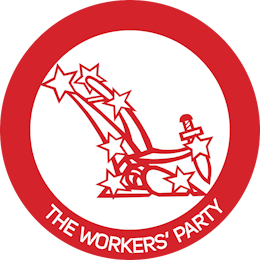
The Continuity Irish Republican Army, styling itself as the Irish Republican Army, is an Irish republican paramilitary group that aims to bring about a united Ireland. It claims to be a direct continuation of the original Irish Republican Army and the national army of the Irish Republic that was proclaimed in 1916. It emerged from a split in the Provisional IRA in 1986 but did not become active until the Provisional IRA ceasefire of 1994. It is an illegal organisation in the Republic of Ireland and is designated a terrorist organisation in the United Kingdom, New Zealand and the United States. It has links with the political party Republican Sinn Féin (RSF).
Sinn Féin is an Irish republican and democratic socialist political party in both the Republic of Ireland and Northern Ireland.

Tom Maguire was an Irish republican who held the rank of commandant-general in the Western Command of the Irish Republican Army (IRA) and led the South Mayo flying column.

The Workers' Party is an Irish republican, Marxist–Leninist communist party active in both the Republic of Ireland and Northern Ireland.

Republican Sinn Féin or RSF is an Irish republican political party in Ireland. RSF claims to be heirs of the Sinn Féin party founded in 1905; the party took its present form in 1986 following a split in Sinn Féin. RSF members take seats when elected to local government in the Republic of Ireland, but do not recognise the validity of the Partition of Ireland. It subsequently does not recognise the legitimacy of the parliaments of Northern Ireland (Stormont) or the Republic of Ireland, so the party does not register itself with them.
The Northern Ireland peace process includes the events leading up to the 1994 Provisional Irish Republican Army (IRA) ceasefire, the end of most of the violence of the Troubles, the Good Friday Agreement of 1998, and subsequent political developments.
Irish republicanism is the political movement for an Irish republic, void of any British rule. Throughout its centuries of existence, it has encompassed various tactics and identities, simultaneously elective and militant and has been both widely supported and iconoclastic.

The 32 County Sovereignty Movement, often abbreviated to 32CSM or 32csm, is an Irish republican group that was founded by Bernadette Sands McKevitt. It does not contest elections but acts as a pressure group, with branches or cumainn organised throughout the traditional counties of Ireland.

The Irish Republican Army (IRA) is a name used by various resistance organisations in Ireland throughout the 20th and 21st centuries. Organisations by this name have been dedicated to anti-imperialism through Irish republicanism, the belief that all of Ireland should be an independent republic free from British colonial rule.

The Irish Republican Army (IRA) of 1922–1969 was a sub-group of the original pre-1922 Irish Republican Army, characterised by its opposition to the Anglo-Irish Treaty. It existed in various forms until 1969, when the IRA split again into the Provisional IRA and Official IRA.
Cumann na mBan, abbreviated C na mB, is an Irish republican women's paramilitary organisation formed in Dublin on 2 April 1914, merging with and dissolving Inghinidhe na hÉireann, and in 1916, it became an auxiliary of the Irish Volunteers. Although it was otherwise an independent organisation, its executive was subordinate to that of the Irish Volunteers, and later, the Irish Republican Army.
The republican movement refers to the Irish Republican Army (IRA) and other political, social and paramilitary organisations and movements associated with it. It can refer to:
Sinn Féin is the name of an Irish political party founded in 1905 by Arthur Griffith. It became a focus for various forms of Irish nationalism, especially Irish republicanism. After the Easter Rising in 1916, it grew in membership, with a reorganisation at its Ard Fheis in 1917. It split in 1922 in response to the Anglo-Irish Treaty which led to the Irish Civil War and saw the origins of Fianna Fáil and Fine Gael, the two parties which have since dominated Irish politics. Another split in the remaining Sinn Féin organisation in the early years of the Troubles in 1970 led to the Sinn Féin of today, which is a republican, left-wing nationalist and secular party.
Marian Price, also known by her married name as Marian McGlinchey, is a former Provisional Irish Republican Army (IRA) volunteer.
Irish republican legitimism denies the legitimacy of the political entities of the Republic of Ireland and Northern Ireland and posits that the pre-partition Irish Republic continues to exist. It is a more extreme form of Irish republicanism, which denotes rejection of all British rule in Ireland. The concept shapes aspects of, but is not synonymous with, abstentionism.
Cathal Ó Murchadha was an Irish politician and republican.
Billy McKee was an Irish republican and a founding member and leader of the Provisional Irish Republican Army.
Clann na hÉireann was a support organisation among Irish emigrants in Great Britain for Sinn Féin during the 1960s and its successor organisation the Workers' Party in the 1970s and the 1980s.

Saoradh is a far-left political party and pressure group formed by dissident Irish republicans in 2016. It is active in both the Republic of Ireland and Northern Ireland. The Police Service of Northern Ireland and independent commentators describe the party as being close with the New IRA, although Saoradh themselves deny this.
The League of Communist Republicans (LCR) was a Marxist-Leninist and Irish republican micro-organisation that split from Sinn Féin and the Provisional IRA in 1986. The league was almost exclusively made up of republican prisoners in HM Prison Maze and their families; In total the membership was approximately 25 to 30 prisoners and a similar number of family members. Founding members included Tommy McKearney, Tom McFeely, James Tierney, Eugene Bryne and Oliver Corr.








